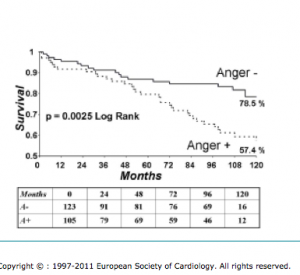How could it have happened?
He was strong; do you remember how he could get uphill? He was fit; can you ever recall seeing him out of shape? His blood pressure was perfect, low even. He bragged about his exemplary cholesterol levels.
He was lean and mean.
Wait a minute…what was that about being mean?
When an endurance athlete in middle age is felled by a sudden heart attack, these questions always arise. It’s mysterious, as the idea holds that exercise and fitness should inoculate one from heart disease. But it does not.
There is more to the story of heart attacks than just the big five: genetics, smoking, high blood pressure, diabetes and cholesterol.
We are humans, not cyborgs. The human heart feels stuff. Intangible things, like love, kindness, laughter, and anger.
This week at the European Society of Cardiology meeting (Paris), a couple of abstracts pertaining to the effects that emotion has on the heart rendered these intangibles slightly more tangible.
In one study, a group from the University of Maryland showed that arteries responded favorably when people were able to laugh. Laughing out loud—to the silly movie Something About Mary–made blood vessels dilate, while watching gruesome scenes from Saving Private Ryan caused them to constrict. The pertinent medical fact here is that dilated arteries are less likely than constricted ones to abruptly close, ie…cause a heart attack. Though only an abstract in a small number of patients, the thesis is that emotions play directly to the elasticity of blood vessels.
 In another study, an Italian group looked at (first) heart attack survivors after discharge from the hospital. Over a decade of follow-up, they found that those who had questionnaire scores high on an anger scale had more than twice the rate of another heart attack. The graph at the right shows that it took about four years for the effect to manifest. (There’s time to change!) Again, this association study doesn’t prove anything, but the data is consistent with the long-held notion that the Type-A personality increases the risk of heart attacks.
In another study, an Italian group looked at (first) heart attack survivors after discharge from the hospital. Over a decade of follow-up, they found that those who had questionnaire scores high on an anger scale had more than twice the rate of another heart attack. The graph at the right shows that it took about four years for the effect to manifest. (There’s time to change!) Again, this association study doesn’t prove anything, but the data is consistent with the long-held notion that the Type-A personality increases the risk of heart attacks.
As a competitive masters-aged athlete and a cardiologist tasked with smoothing (or soothing) the heart rhythm, the idea that anger, emotion and stress affects our arteries, and thus our heart health, holds water. Every workday, I see how the tension of life wears on the human heart. Tension, constriction, inflammation. All those -ion words add up to wear and tear.
Please don’t interpret these words as preachy. As far as behavior and dealing with stress goes, I won’t be slinging any stones. I too, live in the same glass house as my fellow over-achieving, tightly-wound, and sometimes angry cycling colleagues.
Rather, I am intrigued (and reassured) to read how science demonstrates that the human heart is much more than an unfeeling cyborg-like pump. The human-ness of our heart is surely good news.
These kind of data are why I suggest to heart patients that along with their daily exercise, healthy eating and good sleep habits, they smile a lot.
:)))))
JMM
3 replies on “CW: The feeling human heart”
“The pertinent medical fact here is that dilated arteries are less likely than constricted ones to abruptly close, ie…cause a heart attack.”
So this is what ultimately and proximately causes a plaque to rupture, resulting in a heart attack? I’m not sure the science is there yet.
-Steve
Ah, Steve… You are indeed correct. Vascular elasticity is but one of many factors involved in the complex and dynamic process involved with abrupt vessel closure during a heart attack.
The post oversimplified a complex phenomenon.
But…
What’s the over/under on how anger might affect platelet stickiness?
Just be Patch Adams!